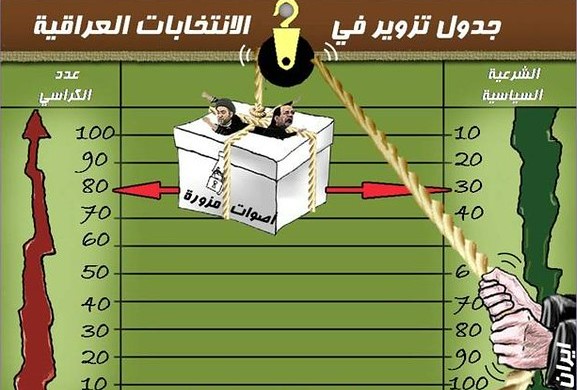Written by Arkan Radeef
In Mesopotamia, we are not free, and our democracy is nothing but a lie. All we really do is choose between one sectarian faction or another, or between killers and the corrupt. It is clear that Iraq has become a state dominated by corrupt sectarian parties and criminal militias, where murder, kidnapping, torture, displacement, disappearances, sabotage, and administrative and financial corruption prevail.
As Iraq’s parliamentary elections approached in October 2021, familiar patterns that have accompanied every post‑2003 election resurfaced. These rotten practices have historically allowed sectarian and nationalist parties to monopolize power over the people and the state — whether under the guise of sectarian religious ideology, reactionary nationalism, or backward tribalism — exploiting vulnerable and uninformed citizens.
One such phenomenon is the targeted assassination and intimidation of activists by Iran-aligned militias, including Asa’ib Ahl al-Haq, Kata’ib Hezbollah, and Saraya al-Khorasani. Political Islamists, backed by foreign actors, fear any competition that might reduce their influence in elections. As a result, they employ tactics of assassination, threats, and intimidation to eliminate genuine rivals. In previous years, these militias were primarily responsible for killing, kidnapping, torturing, and displacing numerous Iraqis, particularly activists. Asa’ib Ahl al-Haq, for example, reportedly compiled a list of 700 activists inside and outside Iraq to silence dissent. Such tactics have forced several parliamentary candidates to withdraw due to ongoing threats via phone or email from influential political factions with armed wings. With the election approaching, assassination, threats, and intimidation are expected to escalate, spreading fear among activists, candidates, and voters to push them out of the electoral process.
Another tactic used by dominant political forces in Parliament has been tampering with the new election law. After the October Revolution, the law was amended but remained on the parliamentary table for eleven months under the pretext that it did not serve the people’s interests. In reality, many provisions were manipulated to benefit current MPs and their parties, as well as deals struck among them. These included raising or lowering candidate age requirements to exclude promising youth, changing educational requirements to accommodate MPs without degrees (particularly those aligned with Iran), and redrawing electoral boundaries to favor sectarian and corrupt parties. Districts were divided along sectarian, ethnic, and demographic lines; areas where these parties lacked dominance were split and merged with stronghold districts to weaken independent candidates. Such gerrymandering also restricted competition to a limited number of candidates, facilitating targeted attacks on independents.
Calls to boycott elections have reappeared, broader than ever and sometimes including political parties. These boycotts cite corruption in the Independent High Electoral Commission and the fact that many commission staff are aligned with sectarian parties, controlling polling centers across Iraq. These operatives contributed to the loss of between 1.5 and 3 million voter cards out of 25 million and assisted in hacking, sabotage, and tampering with electronic servers and storage units to favor their parties.
Explosions and arson have also become predictable pre-election phenomena, with offices and public properties targeted in acts of political sabotage. Between 2011 and 2018, Baghdad’s Aviation Square alone witnessed nine bombings during election seasons or government-formation talks, resulting in 158 deaths and over 300 injuries, while intelligence and security agencies failed to act.
Nothing unites people like a common enemy. Consequently, sectarian rhetoric has intensified ahead of the elections, as corrupt politicians, parties, and militias know it is the quickest way to influence vulnerable minds. Illicit political funding has also emerged, typically sourced from powerful militias and entrenched parties, supporting candidates willing to implement their agendas after winning.
The upcoming parliamentary elections offer little hope for meaningful change. Results are likely to favor partisan, sectarian, ethnic, and nationalist forces, leaving Iraq’s future in the hands of corrupt Shiite, Sunni, and Kurdish elites. Yet history teaches that people endure and that tyrants ultimately meet their end. To achieve real change, Iraq must uproot the entire corrupt political class and build a nation inclusive of all citizens, regardless of sect, ethnicity, or tribe.

The elections in Iraq are often viewed as manipulated and compromised, with widespread corruption and external influences undermining their legitimacy and the true will of the people